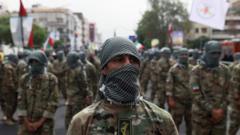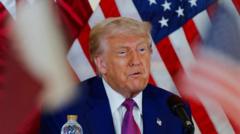As President Trump aims for a negotiated deal with Iran regarding its nuclear program, he faces pushback from Republican hardliners who have long demanded stricter actions. Meanwhile, Arab leaders emphasize the urgency of avoiding heightened regional conflict.
Trump Seeks Compromise with Iran Amid GOP Tensions Over Nuclear Deal

Trump Seeks Compromise with Iran Amid GOP Tensions Over Nuclear Deal
President Trump expresses a desire for a nuclear agreement with Iran, challenging conservative expectations and urging regional stability.
By every indication, President Trump is keen on establishing a deal with Iran concerning its nuclear ambitions, aiming to steer clear of a military confrontation. During a recent visit to Saudi Arabia, Trump publicly declared, “I want to make a deal with Iran,” highlighting his hope for increased safety in both the Middle East and the broader world.
This shift in approach comes amidst a backdrop of changing diplomatic dynamics in the Gulf. In 2015, when Iran previously consented to curtail its nuclear activities, it was largely viewed as a threat by neighboring Gulf states, which worked to shun it. However, recent overtures from those very leaders reflect a desire to mend ties with Iran, prioritizing stability over escalating tensions—especially given the ongoing conflict in Gaza.
Arab influencers have been vociferously advocating for a resolution between the U.S. and Iran, warning of dire consequences if no agreement is reached. According to Ali Vaez, Iran director at the International Crisis Group, an unchecked Iran or one that faces military action present equally unfavorable scenarios for the region.
The potential for a U.S.-Iran deal is poised to challenge the more conservative factions within Trump’s Republican base. This group remains steadfast in their demand for a complete dismantlement of Iran’s nuclear program. Indeed, over 200 Republican congressional members recently issued a letter advising Trump to maintain a hard-line stance against Iran.
In light of growing apprehensions surrounding the prospect of a nuclear-equipped Iran igniting an arms race in the Middle East, the implications of any negotiations underscore the delicate balance of power in an already volatile region—a reality that demands careful navigation to prevent significant miscalculations among competing nations.





















